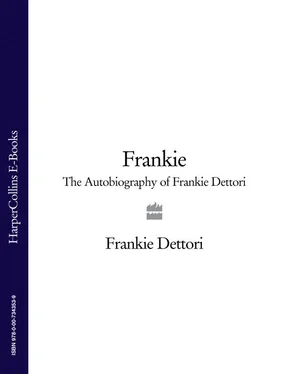Then I began to realise that God had saved me. I was going to die and he spared me. Why? Obviously it wasn’t my time. And because my life almost ended far too soon, I decided there and then that I was going to make the most of it the second time around.
As a small boy I wanted to be a petrol pump attendant when I grew up. Well, the price of petrol was very high then. It seemed like a rewarding career. Later I fancied myself as a professional footballer, but it was my destiny to become a jockey. My dad Gianfranco was champion jockey thirteen times in Italy and also won lots of big races in England, but he didn’t sit on a horse until he was twenty and stumbled into racing by chance after he left the family home in Sardinia to seek fame and fortune on the mainland.
His father Mario, my grandfather, had an iron will. He stood little more than 5ft 2in tall and came from a family who were often penniless. He was a man’s man—tough, stubborn, hard as nails—and could be an absolute bastard. We all called him Super Mario and you will soon understand why. He was doing odd building jobs, earning money where he could—sometimes in the mines at Carbonia—when Italy became involved in the Second World War in June 1941 as an ally of Germany.
Soon the Germans were everywhere in Sardinia with several army barracks, but at least there was no fighting on the island. Once my grandfather joined the Italian Army he was based full-time in barracks, which was a bit of a problem because his wife Apollonia lived thirty miles away from the camp. He used to tell me stories of how he cycled over to see her whenever he was free. Since the tyres on the bicycle were old and worn, his journey would often be interrupted by punctures which he mended with the crudest of equipment.
Mario’s love for my grandmother cost him dear. When he failed to return to camp in time one Monday morning he was put on a charge and locked in a cell for a month. The second time it happened they tied him to a pole in the middle of a courtyard and left him there for several days, maybe a week. Ants creeping all over his body made him so itchy that they nearly drove him mad. In desperation he shook the pole so hard that it broke and came crashing down and he was put in a cell once more. You might think that he had learned his lesson by then, but the Dettoris are resolute in matters of the heart. Once he’d completed his sentence he rushed off for a reunion with my grandmother and failed to return to barracks before the curfew yet again.
This time there was no escaping serious punishment. Mario was immediately sent to the front at Montecassino early in 1944, where one of the fiercest battles of the war was raging around the famous monastery—which was eventually destroyed by Allied bombers after months of heavy fighting. It came at the point in the war when the Allies were trying to drive the Germans out of Italy. Casualties were horribly high in the battle for Montecassino, south of Rome. It was a bloodbath. Mario told me he spent six months crouching in the trenches there and escaped with no more than a small scratch on his arm from a stray bullet.
The way he told it to me years later, rain fell for weeks on end and the only way he managed to keep himself from sinking into the mud at night was by sleeping on a lilo in the trenches. He smoked incessantly, and quickly learned never to put his head above the parapet—for the very good reason that those who did immediately came under fire, often with fatal results.
Once Italy was liberated by the Allies, Mario returned home to Sardinia and started working in the local mines at Carbonia which supplied coal for much of the mainland. Since he was a builder he had the perilous job of erecting a barrier with bricks and cement at great speed to stop fire spreading whenever it broke out. This required great skill and courage because he was obviously the last man out when a fire started. Mining was much more primitive then and he saved quite a few lives.
My grandparents had six children, all boys, but one died at birth. Pepe was the oldest followed by Gianfranco, Salvatore, Sandro, and finally Sergio. Eventually Mario left the mines and began his own building business, though there were months at a time when he was unemployed. As the boys grew up and left school they all began working for him. My dad remained at school until he was sixteen, which was like going to university in those days in such a poor community.
My dad was pretty cute and soon realised there was more to life than toiling away for his father for ten hours or more a day, mixing cement for the modest reward of just a bowl of pasta with beans and a roof over his head. After months of hard labour he couldn’t see any sort of future. So, one day, with huge blisters on his hands, he hurled his bucket and shovel into a well and informed my grandfather that he was leaving home. Mario’s response was typical: as my dad walked away he heard Mario shouting that he needn’t bother to return.
Gianfranco just about had the price of a ticket for the ferry that took him to the mainland. He headed for Rome and stayed with one of his brothers until he found a job washing plates in a restaurant. Soon he moved on to a second restaurant where he lived in the cellar with his sparse belongings. These he kept on a shelf to avoid the attention of rats. When it poured with rain one night, the cellar flooded and everything he owned was swept away.
Dad was left with nothing, but you are resilient at that age and all he cared about at the time was chasing the girls and smoking cigarettes. He was just exploring life and worked like hell to pay for his fun. He switched from washing dishes to selling fruit and veg at a market stall. This also involved making home deliveries, a job that offered unexpectedly exciting perks from some of the housewives he met on his daily rounds.
My dad was smart, had a bit of charm and an easy smile. He was hungry for life and kept moving on, looking for a break. One of the stall holders was a policeman who also owned three trotting horses, stabled at Tor di Valle racecourse in Rome. Soon Dad began looking after these three horses, even though at first, he didn’t have a clue what to do with them. He learned by asking and watching other lads at nearby stables, and within a week he was quite efficient at attaching the horses to the sulky, which is the little chariot used in trotting. He was also feeding the horses and mucking them out twice a day, throwing out the manure, adding fresh straw, and brushing around their stables.
He did this all by himself in return for an unlimited supply of cigarettes, as many packs as he could puff his way through. He was small, stocky, extremely fit and bright enough to realise that there wasn’t much money in looking after trotting horses. Some friends suggested he switch to the Capannelle, then the home of Italian horse racing. So he turned up there, offered his services to the first trainer he met, and at the age of eighteen signed up as an apprentice for five years—even though he’d never sat on a horse in his life. It was the start of an odyssey that would make him the most successful jockey in the history of Italian racing.
In those days an apprentice in racing was not much more than a slave, expected to do all the hard, dirty, dangerous and menial jobs for minimal reward. In the first few months he toiled away, cleaning out stables, sweeping the yard, and feeding the horses without so much as climbing onto their backs. The opportunity he craved came in the most unlikely circumstances. The adjoining stable at the Capannelle housed a lunatic racehorse called Prince Paddy. My dad says it was so mad that no-one dared go near it. The only way they could brush its coat with any degree of safety was with a long-handled broom. When the man who trained and looked after this crazy horse became ill with flu, no-one wanted to risk handling the beast in his absence.
Читать дальше












